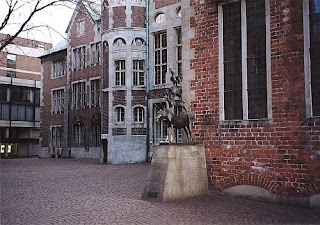The landlords thought they bought a hen.
Strutting by my brother’s window, feathers erect for the last time, the rooster
crowed. All that my brother knew of the world from inside the cottage—silence,
singularity, and blood—had magnified. I noticed the cups looked a little grimy
around the rims. He was slipping. I wondered who he would tell. He was so proud
he might leak it out, infect the whole community without fear of prosecution.
His faulty arguments, It’s the same as
eating chicken and how is killing ants
any different, resounded. First the dog, then frogs, now the morning
crooner. All day calling out confused on the other side of the cornfield.
But I can't remember the rest, and don't
want to—it's too far back—to be sure of anything is to feel the world drifting
away. Is it possible to remember?—I hardly know.
I turn the old fashioned key, pulling
towards me full strength, until it opens. Then I lock the bike turning the
black circular bar and remove the key, putting it in my pocket. You can go out to the park. Ride your bike to Worpswede. Neither the
ground nor sky feels hard, as if no decision has been made. Threatened by a
quiet sarcastic father and silenced by a controlling mother, a worshipper of
Marxism. They rode bareback without clothing in the winter, incurring shiny
blue black striations, like a glacier.
Every winter, until my brother and I were
ten or twelve, ice pushed down on the fields until it layered. Through the
window, we watched our parents haul reeds from the swamp, thatch a roof. They designed
houses for our community of artists, down to the wallpaper, taught themselves
stained glass and weaving. They harvested rows of corn for pig feed, baled
straw in a cylinder shape. They entertained on our rose-ringed lawn, my mother
wearing wide-legged slacks, poet’s shirt, tom-boy hair cut, and around her neck
the marcasite heart pendant of her mother’s. With their artist and intellectual
friends, they exchanged ideas on transportation, and what kind of art was
important, earmarking time.
When I found the pocket watch, I stopped.
He must have dropped it on one of his walks through the cornfield, which lay
between our place and the neighbors. He liked to watch the ears grow, compare
row against row. I hardly ever went inside the forest and had certainly never
visited the chicken coop before, on the far side. The watch lay on the ground
in the latched coop. He had moved across to the cottage of our neighbors last
month. We celebrated his seventeenth birthday and he said he wanted landlords,
not parents. My mother started crying. My father just got up and left the
table. My brother explained that since he started teaching those yowley
children in town, he wanted to come home to quiet.
Our father,
when he tried to find a light bulb, would search through every scrap under the
kitchen sink. And the chink of metal
carried from inside the garage when he wanted to replace a car door handle or a
latch for a cupboard. At night, he would rinse the dishes carefully but when
eating creamed corn out of a pot, he scraped the spoon against the sides just
make sure we were still awake. He took a knife to the toast, burnt every time,
making a hush, like shoes on sand. He would finally fall asleep on the dining
room table, cup of coffee untouched beside his head. When we spied on him the
color returned to his drained face and his head bobbed like the bird at the
barber shop. He would wipe his face with a dish towel, nose buzzing,
capillaries on either side exploding like a volcano.
We got sarcasm instead of answers. It’s on the roof or lets go to Moscow—quotes we wrote down to later dramatize. He
contradicted himself in a sentence, invented a word or concept. And sometimes
we purposely misunderstood. He kicked the door in, broke records. Because he
scheduled his counseling appointments during dinner, mother made him agree to
Sunday drives, where returning late, neon lines were the only markers against
pitch. Patient notes blurred work and home, littering the night table; in the
morning, they would return to a corner square. Patients would call to hear
words of wisdom and praise him to us. One time I counseled a suicidal woman.
In the desk
to the right of the front door, in the bottom drawer, there is a picture.
Mother says that when my brother was a baby, father was lit up, glowing a warm
yellow like an old fashioned lamp post. In the picture the man sits crossed
legged on the white tatted spread, curly brown hair flopping to the front,
holding my brother on his lap. With the same eyes they face the camera.

No comments:
Post a Comment